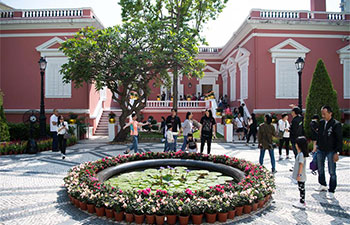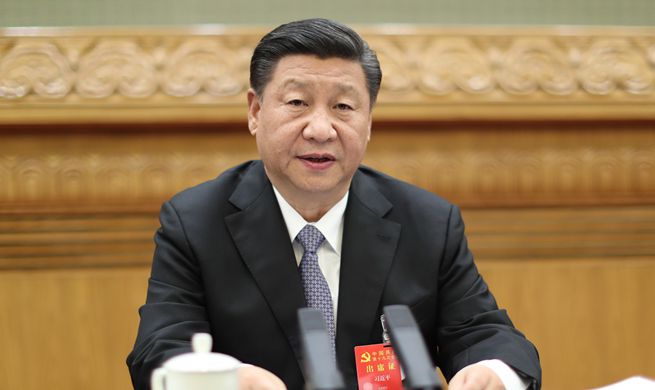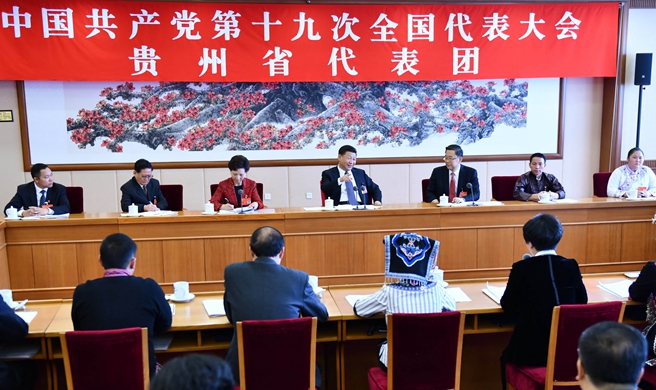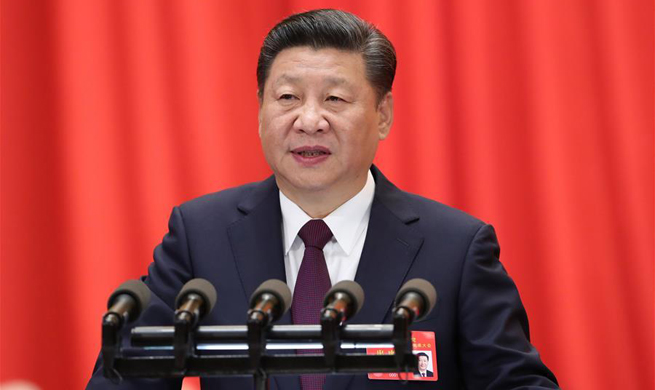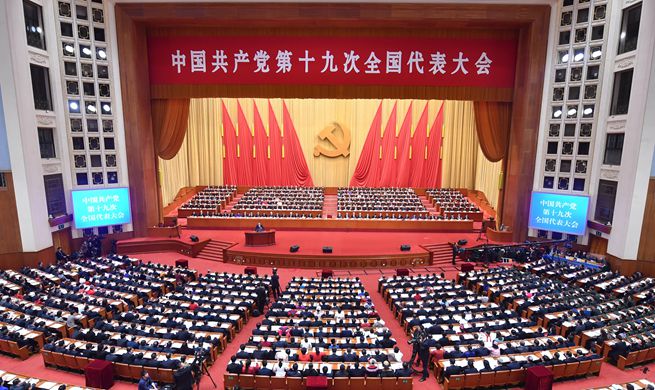by Jon Day
TOKYO, Oct. 23 (Xinhua) -- Japanese Prime Minister Shinzo Abe's ruling coalition secured a comfortable victory in Sunday's general election and retained a two-thirds majority as an embryonic and divided opposition camp had little hope of causing an upset, with a powerful typhoon ensuring that voter turnout was low.
The win for Abe and the LDP-bloc came as little surprise to experts on the matter here who predicted that the opposition vote would be divided between the Constitutional Democratic Party of Japan (CDPJ) and the Party of Hope (PoH), two parties cobbled together just weeks before the election from the ashes of liberal and conservative wings of the moribund Democratic Party (DP).
Yu Uchiyama, Professor of Politics at the University of Tokyo, said that for the electorate the opposition camp simply wasn't viewed as a viable alternative to the LDP.
"I don't think the opposition camp represented a viable alternative to the LDP because the opposition parties are too fragmented and this is an important factor which has bolstered Abe's government," Uchiyama told Xinhua, prior to the polls opening.
"As votes cast against the LDP have been dispersed, the LDP has been able to stay in power," he said, adding, "given the fact that the opposition camp is composed of parties with a variety of ideologies, it doesn't seem easy for it to make a unified challenge to the LDP."
The ruling Liberal Democratic Party of Japan (LDP) emerged from the election with 283 seats in the lower chamber of Japan's bicameral parliament, and their junior Komeito coalition partner won 29.
The LDP on its own secured well beyond the 261 threshold defined as a "stable majority" in the 465-member lower house.
Along with an ideologically disparate opposition camp, Abe's dissolving the lower house and calling a snap election on Sept. 28 gave both newly-formed opposition parties little time to select candidates and effectively communicate their policy stances to the electorate, analysts here said.
"Abe called the snap election to take advantage of a weak, divided and unprepared opposition. That has worked out well for him and none of the other parties were polling in double digits," Jeff Kingston, director of the Asian Studies at Temple University Japan, told Xinhua.
"Koike mismanaged the merger with the Democratic Party and doomed the Party of Hope," Kingston, also the author of "Contemporary Japan: History, Politics, and Social Change Since the 1980s", said, adding that Japan's security situation regarding the Democratic People's Republic of Korea (DPRK), also helped Abe.
And while the liberal CDPJ emerged on top among the opposition contenders, gaining swift traction after campaigning kicked off, the reform-minded conservative PoH, led by Tokyo Gov. Yuriko Koike, failed to impress, particularly in the capital, where it lost in all but one district of the 23 in Tokyo in which it fielded candidates.
This scenario was widely expected by informed sources here.
"Governor Koike's Party of Hope are little more than LDP-lite'," Dr. Tina Burrett, Associate Professor of Political Science at Sophia University, told Xinhua.
"Koike herself was a member of the LDP until recently and served in prime minister Abe's first government as Defense Secretary. On the constitution, an important issue in the election, the views of her and her party differ little from Abe's. She doesn't have a clear economic policy and wage stagnation, specifically, is a key issue for voters," said Burrett.
She went on to explain that Koike's decision not to run for the Diet herself and her party's policies being similar to those of the LDP did little to garner support from the public. Adding that by refusing to allow pro-Article 9 left-wingers from the Democratic Party to join PoH, Koike, in fact, did the progressive left in Japan a favor.
As for the CDPJ led by former Chief Cabinet Secretary Yukio Edano, Burrett said it "offers a clearer policy alternative to the LDP, but the party was unable to field more than 72 candidates as it formed only very recently."
These factors, as an amalgam, all played nicely into the hands of Abe and his LDP, leaving the public with little choice but to stick with the status quo at least for the time being, experts here said, highlighting the quick rise and fall of support for PoH and the CDPJ's future potential, as Dr. Shin Chiba, professor with Special Appointment at the International Christian University, explained.
"PoH, led by the very popular female governor of Tokyo, Koike, aroused high expectations in the beginning. But ordinary people quickly began to notice that the LDP and PoH are the same soup' with a somewhat different flavor," Chiba, who specializes in political theory, told Xinhua.
"PoH is highly conservative in many ways, on the issues of national security and constitutional change in particular. So suddenly expectation faded and the CDPJ has currently caught the new wind' due to the fact that this is the only viable party that represents the liberal voice of ordinary people who want to keep the pacifist constitution, critical civil society, and the liberal-democratic regime," Chiba maintained.
He added that the vital question will be whether the CDPJ can establish itself as a viable alternative party in the near-future, post-election phase of Japanese politics.
"I think the party (CDPJ) has a good chance, because the majority of people have begun to feel weary of the LDP's slogan-only and deceptive politics, prime minister Abe's style of the privatized use of public power, and the LDP's rather hawkish stance toward diplomacy and East Asian international relations," said Chiba.
Some experts on the matter asserted that indeed the public did have alternatives in the lower house campaign, technically, but the question of the opposition parties' viability and the public's insecurities, as well as structural advantages, helped propel Abe and the LDP to the winning post, with the victory possibly boosting Abe's chances of succeeding in the LDP leadership contest in September next year and, potentially, becoming Japan's longest-serving prime minister.
"It would be easy to blame the incompetence of the center-left, particularly since 3.11 (earthquake-triggered tsunami and Fukushima nuclear disaster), in both electoral politics and governance, but there are structural components that perpetuate the LDP's dominance," explained Christian Collet, from International Christian University's Politics and International Relations faculty.
"LDP leaders are, for better or worse, familiar faces and the public's well-known insecurities: geopolitical, economic and cultural, come into play," Collet told Xinhua.
"In elections, the influence of special interests that have traditionally backed the LDP, dynastic political families, as well as significant generational and gender gaps among voters, have long-helped to create structural advantages that are difficult for opposition parties to overcome," he said.






